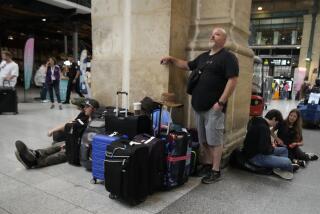Russia bombings: Close enough to Sochi Olympics for terrorists’ aims
- Share via
With a little more than 400 miles between them, Volgograd is as far from the southern Russian resort of Sochi as Los Angeles is from Lake Tahoe.
But for the purpose of sowing fear throughout Russia and among foreign athletes and spectators headed to the Olympic Games in the next few weeks, the suspected twin suicide bombings in the Volga River city were close enough to the sporting venue for the Islamic separatists presumed to be behind them.
The Caucasus mountain region between the Caspian and Black seas has for centuries been a seething caldron of ethnic and religious conflict between the Islamic peoples of statelets such as Chechnya, Ingushetia, Dagestan and Ossetia and the Russian forces that have sought to vanquish them.
Post-Soviet Russia fought two wars in the 1990s to quell Chechen separatism, and the region has since been a launch pad for dozens of terrorist strikes against Russian cities and symbols. Caucasus militants over the last dozen years have killed hundreds of civilians in attacks on airports, trains, subway stations, schools, hospitals and theaters, all part of a loosely coordinated campaign of terror aimed at forcing Moscow to grant the predominantly Muslim region self-rule.
Chechen rebel leader Doku Umarov warned in July that Sochi would be a target of the multi-pronged insurgency, calling the Winter Games “satanic dances on the bones of our ancestors.”
Although the Olympics don’t begin until Feb. 7, Sochi is already robustly patrolled by naval vessels along the Black Sea coast, and heavily defended checkpoints are operating along the roads and rail lines leading to the host city on the western flank of the roiling Caucasus.
But the back-to-back attacks that hit the main train station in Volgograd on Sunday and a crowded trolley bus the following day found a historically significant target outside of the tight security cordon around Sochi, demonstrating that the radicals can make good on their threats to disrupt the Olympics.
“The reality is that this has created panic in Russia writ large, in a way that would be the case regardless of the Sochi tie-in. But with the Olympics looming, people are going to be on edge about soft targets and all places where insurgents might strike next,” said Andrew Weiss, a former advisor on Russia to the Clinton administration who is now vice president for studies at the Carnegie Endowment for International Peace.
Weiss notes that to beef up security in and around Sochi, police and troops have been deployed from elsewhere in Russia, leaving even heavily guarded Moscow more exposed than usual.
The Volgograd attacks, at least one of them traced to Dagestan, also highlight the difficulty Russian security officials face in containing a threat from separatist groups that share an ideology but little in the way of coordination or command, Weiss said.
Others point out the blow to Russian security forces’ image from the Volgograd attacks, which killed at least 31 people and injured dozens.
“It certainly affects the overall perception by the international community on whether Russia can guarantee that the Olympic Games will not fall victim to terrorist attacks,” said Simon Saradzhyan, a terrorism scholar at the Belfer Center at Harvard University’s John F. Kennedy School of Government.
“Volgograd is the same distance from Sochi as Makhachkala, the capital of Dagestan, that has produced two suicide bombers in the last two months,” Saradzhyan said, citing Sunday’s train station attack and another Volgograd bombing on Oct. 21 in which a Dagestani woman blew herself up on a trolley.
Volgograd might have been chosen, he speculated in an interview Monday, to demonstrate that the extremists’ reach from their Caucasus strongholds could easily extend to Sochi.
Volgograd, which was known as Stalingrad in the middle of the 20th century, also occupies an important place in Russian hearts and history. It was the site of a horrific battle that halted the Nazi advance and helped turn the tide of World War II in the Allies’ favor.
Saradzhyan surmises in a journal entry that the suicide attacks were aimed at stirring up ethnic rioting by Russian nationalists and the minorities from the Caucasus and Central Asia who are often the targets of police repression.
“But Moscow would be a much more significant target, so the attacks on Volgograd might show that the capabilities of these groups are diminished,” Saradzhyan said of the pre-Olympic strikes far from the Russian capital.
He acknowledged, though, that reading strategy into the terrorists’ choice of targets is “a guessing game,” and that more may become apparent about their abilities and aims as the Olympics opening ceremony approaches.
“You cannot seal off everything,” Saradzhyan said of the massive deployment of security forces to the competition venues. “There’s always a chance that something will happen, and of course these extremist groups will try and do their best to disrupt it.”
A foreign correspondent for 25 years, Carol J. Williams traveled to and reported from more than 80 countries in Europe, Asia, the Middle East and Latin America.
More to Read
Sign up for Essential California
The most important California stories and recommendations in your inbox every morning.
You may occasionally receive promotional content from the Los Angeles Times.











